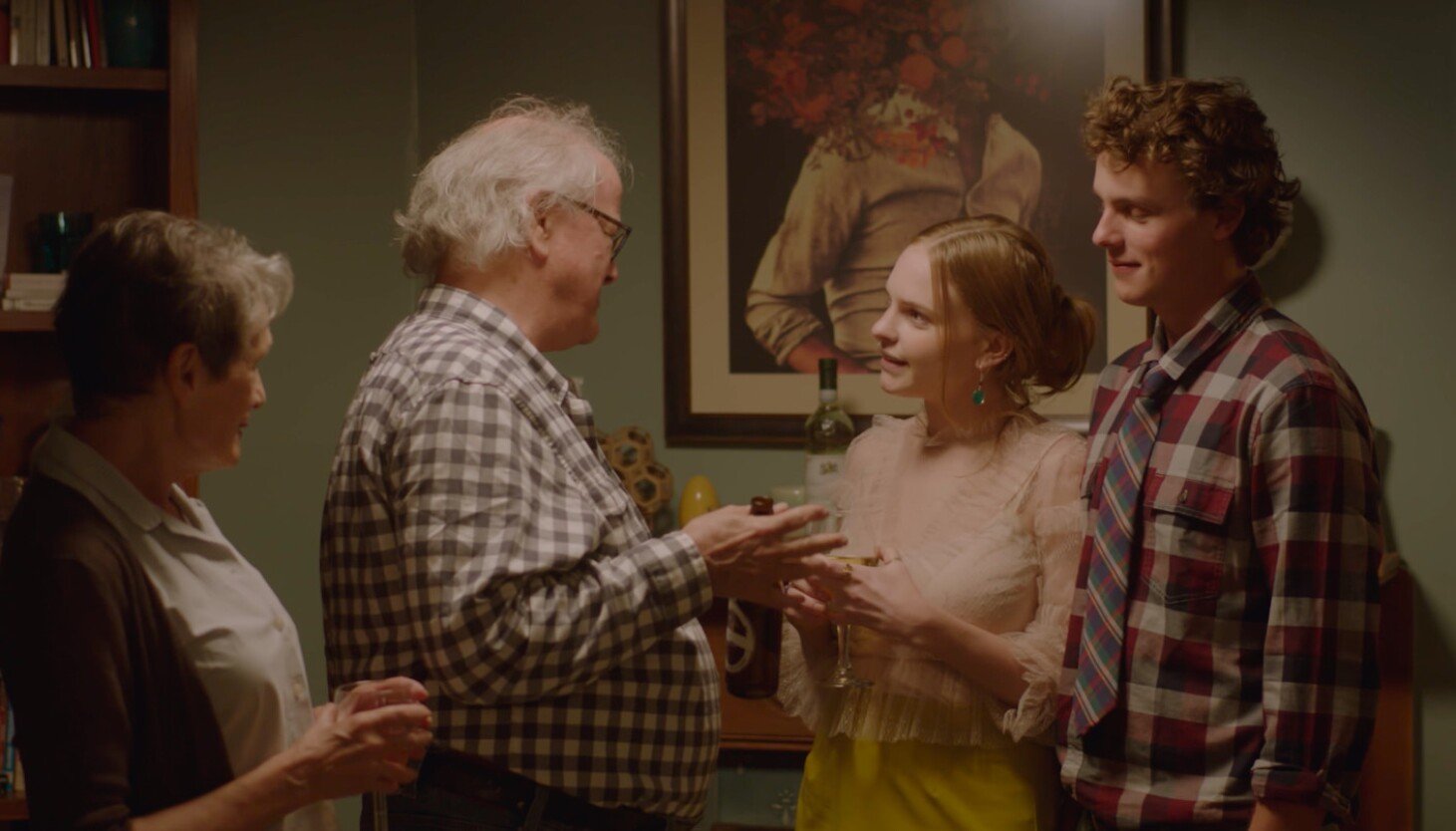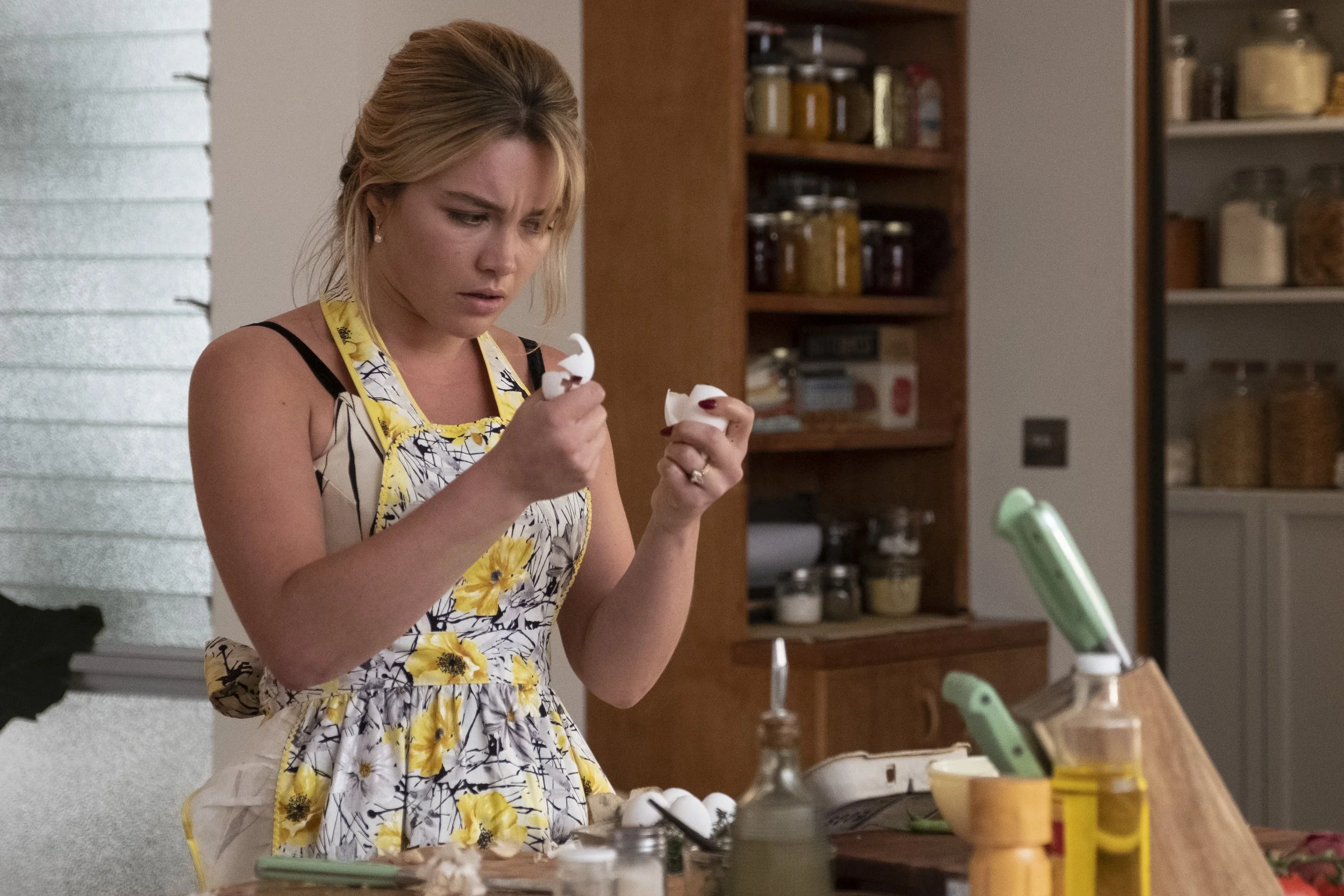Relative (2022)
Hearth-healthy
Despite what they say (whoever “they” are), age doesn’t always bring wisdom. Look no further than the films of Michael Glover Smith for eerily insightful proof that people’s intimate relationships often reinforce the personalities involved, rather than mold them. To upend another cliche, a lover’s eyes are mirrors to the soul, not windows.
2015’s Cool Apocalypse invited us to eavesdrop on a rocky double date with four young Chicagoans—one just starting out, the other on the verge of implosion. Two years later, Mercury in Retrograde tripled the number of pairings; extended our time with them to a long weekend getaway in the Michigan woods, and introduced a married couple into the mix. 2018’s vignette trio, Rendezvous in Chicago, broke the unified narrative formula and offered even more variety in the relationships being depicted. There aren’t really character arcs in these films so much as there are coupling arcs. It seems Smith’s thesis is that people find one another as they are and pretty much stay the same. The individual personalities are set very early on, and it’s up to perseverance, chemistry, and circumstance to determine how (or if) two distinct halves will survive as a whole.
The writer/director’s exploration continues* with Relative, which widens each couple’s radius, pulling back from the individuals and their friend groups to focus on the most fundamental influence on a person and their relationships: the family. Set in the Chicago suburb of Rogers Park, Relative follows the geographically and temperamentally disparate Frank family. Elderly parents Karen (Wendy Robie) and David (Francis Guinan) have invited all their grown kids home to celebrate their youngest’s college graduation. Benji (Cameron Scott Roberts) can’t wait to move out and begin his career as a digital cartographer for Google—unlike his much older brother, Rod (Keith D. Gallagher), who hasn’t left his folks’ basement in the half-decade since a devastating breakup.
Middle sisters Evonne (Clare Cooney) and Norma (Emily Lape) make the trip from Wisconsin and Iowa, respectively. Norma leaves her own family behind, while Evonne brings her wife, Luce (Melissa DuPrey), and their daughter, Emma (Arielle Gonzalez). Soon, the Franks’ house is packed with bodies and drama: old grudges collide with new secrets; odd alliances form, and just about everyone learns the age-old lesson about never going home again.
At a glance, it’s easy to lump in Relative with the dozens (hundreds? thousands?) of weekend-reunion dramas. However, Smith’s allergy to the subgenre’s conventions elevates his movie in deceptively profound ways. Sometime after the credits rolled, I realized just how deliberately untidy the ending is, how many strings are left dangling—and not in the way that suggests Smith didn’t know how to finish his movie.
Real-world get-togethers rarely involve people experiencing whole chapters of their lives over the course of One Fateful Night. Though plenty of movies exploit compressed time to great dramatic effect (for the simple reason that they can’t literally go on for weeks and months on end), it’s refreshing to see snapshots from filmmakers like Smith who aren’t afraid of incomplete circles. When he’s really on fire (as he is in Relative, especially toward the end), he presents the audience with something that feels like more than a movie. He taps into the sweet spot of human experience that’s so very personal yet which, if you talk to enough people, turns out to be startlingly universal.
We don’t need to know what happiness or heartbreak awaits Norma when she walks through her front door at the end of the movie; it’s enough to know that, out of all the siblings whose life crises took center stage over the weekend, hers got the least amount of attention (when it might have, in fact, needed a whole lot more). This isn’t just an invitation to imagine what happened to Norma, but to remember times when we didn’t get the support we needed from our support systems; how that affected us, and how we might learn to be more alert to the less obvious cries for help from those around us—or be more assertive in asking for help from the people we depend on.
I don’t mean to make Relative sound like a blood-bound Big Chill. It’s not a downer by any stretch, thanks in large part to Elizabeth Stam’s character, Hekla. She’s an aspiring actress from one of Benji’s college classes whom he works up the nerve to ask out on a date. They wind up at the family party and everyone (including Benji) pretty much falls in love with her.
You don’t have to listen very hard to hear the “Manic Pixie Dream Girl” alarms going off. It’s a weak claim, but it deserves a rebuttal. MPDG’s are often young, attractive, “girly” vessels of pure delightfulness that uplift a depressed protagonist into not being such a worrisome sadsack. There’s no arguing that Hekla lights up a room, but Benji isn’t Rod. He’s optimistic, carefree (to the point of ditching his own graduation party for a date), and has a world-conquering spirit—with code monkey ambitions.
Here’s a challenge to those who would still see Hekla as a device rather than a person: So what if she is a Manic Pixie Dream Girl? We don’t spend enough time with her to know if there are roiling dark complexities brewing beneath her penchant for whimsical Oscar Wilde monologues. Even if there aren’t, would being happy and seeking romantic love from someone else make her less of a three-dimensional person? Are we only as valuable as our suffering? If your answer is “yes”, I recommend either touching some grass or finding a better class of friends. Well-adjusted rays of sunshine aren’t unicorns. They are, in fact, everywhere.
Hekla and Benji’s relationship is, I think, the key to Relative. It is the newest and has the fullest potential. They might end up married for decades like Karen and David, navigating the ups and downs of compatible but fundamentally different personalities and raising kids (which throws a truckload of wrenches into even the most loving of long-term bonds). They could be like Evonne and Luce, who put up a unified front but whose bedroom conversations suggest there’s a lot of work to do—and uncertainty on each person’s part of the other’s willingness to roll up their sleeves. They could become Rod and his ex, Sarah (Heather Chrisler), who couldn’t make things work but who are destined to be in each other’s lives for a good long while. Benji and Hekla could even become like Norma and her husband—whatever the hell that means.
Or they could become their own unique thing. You can view their budding romance as proof that Smith wrote a happy ending for them. But he plants the seeds of struggle early on, during Benji’s last day of college:** his professor encourages him to pursue his writing about film, which he’s clearly passionate about and adept at. But he’s also really into maps, and has landed a high-paying job at one of the world’s largest companies. Hekla is (for now) uncompromising in her pursuit of a career in the arts; Benji is more practical and seems willing to tuck in his passion if it means not ending up like couch-crashing, video-game-addicted, dope-smoking Rod. Benji’s denial of what may be his true calling (no matter how well-intended and pragmatic) could cause real problems for himself and Hekla down the line.
But who knows? It if ever comes to that, maybe Hekla will sprinkle some Manic Pixie Dust on her mopey map man and conjure up a picture-perfect ending.
Either way, they will evolve together—not necessarily as individuals but definitely as a couple. Though Relative posits that families can really mess people up (and by extension, their relationships, communities, countries, etc.), it also reminds us that they can heal us, too, even if imperfectly and not all at once. This film is hopeful, real, and dare I say, wise.
Chicagoans! Relative begins its suburban expansion tonight at 7:30pm. Join me at the Hollywood Boulevard Cinema in Woodridge for a special screening and Q&A with writer/director Michael Glover Smith and star Emily Lape! Click here for tickets and more info!
And for more thoughts on Relative, watch my YouTube review with Keeping it Reel’s David Fowlie!
*I was tempted to use the word “culminating”, but I wouldn’t put it past Smith to keep documenting every stage of human relationships, up to and including the afterlife.
**His last class is Film Studies. Eagle-eyed viewers will notice a projector slide that references the 2018 film Mercy’s Girl—an absolutely essential Chicago-set drama that was written and directed by Emily Lape, who plays Benji’s sister, Norma, in Relative.





